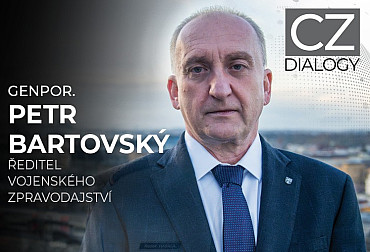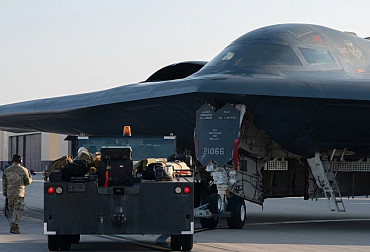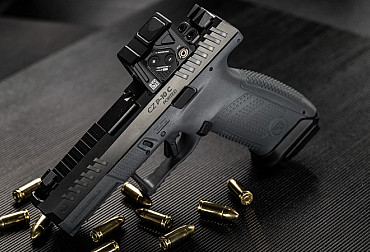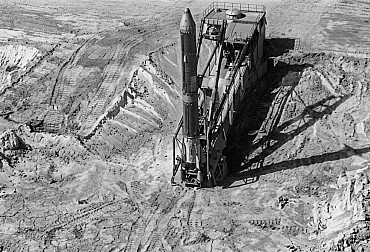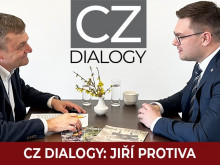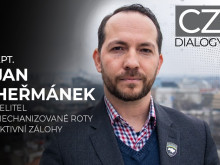Jana Černochová: We have successfully launched the largest modernisation of the Czech Armed Forces in modern history
Over the past five years, the security situation in Europe and around the world has changed dramatically. At the beginning of her term, the Minister of Defence announced ten priorities that are key to maintaining the capabilities of the Czech Armed Forces. A number of modernisation projects have been announced and launched, state-owned enterprises have been set up, and communication with representatives of the defence industry has been initiated. New parameters for soldiers' pay have also been set recently. At the same time, it must be said that despite all efforts, the Capability Targets for the period up to 2025 have not been met, and the army must now meet new targets. Recruitment to the army is also not going well. We discussed all this with Defence Minister Jana Černochová on our programme CZ DIALOGUES.
Video: Interview with Minister of Defence Jana Černochová / CZ DEFENCE
Madam Minister, this year marks the 80th anniversary of the end of World War II. Unfortunately, most of those who participated directly and witnessed the events are no longer with us. Is contemporary Czech society capable of realising what a horror it was and to what extent we relativise that period?
Unfortunately, veterans of the Second World War are leaving us practically every week. At present, we have 59 veterans of the Second World War, which is why I am always very happy when at least some of them take part in the commemorative ceremonies we organise at Vítkov. I think it should be a huge reminder to all of us that a generation of men and women who were willing to risk their lives for our democracy and our freedom is truly coming to an end. They did not want to be part of a protectorate, so they joined the resistance or fought directly in the battles. As Minister of Defence, I am doing everything I can to ensure that there are no more wars and that our people do not have to fight in them. However, I am also striving to ensure that they are prepared for any fighting that may arise if something serious happens. Because the best prevention against war is to be prepared for it. This applies to the number of trained and equipped professional soldiers and members of the active reserves who are part of a modernised army. In terms of technology, I think we have come a long way in three years. And that is one of the reasons why I joined the Ministry of Defence in the first place, because I knew that it was up to us and that it was not five minutes to midnight, but five minutes past midnight. After all, Donald Trump's administration, which took office at the beginning of this year, made it very clear to Europe that Europe's problems are not their main concern and that Europe should think about its own defence capabilities. This means that the European part of the North Atlantic Alliance should step up, and do so emphatically, whether in defence spending or recruitment targets. We have set our recruitment targets under the new Capability Targets at 37,500 soldiers, which is 50% more than we have now.
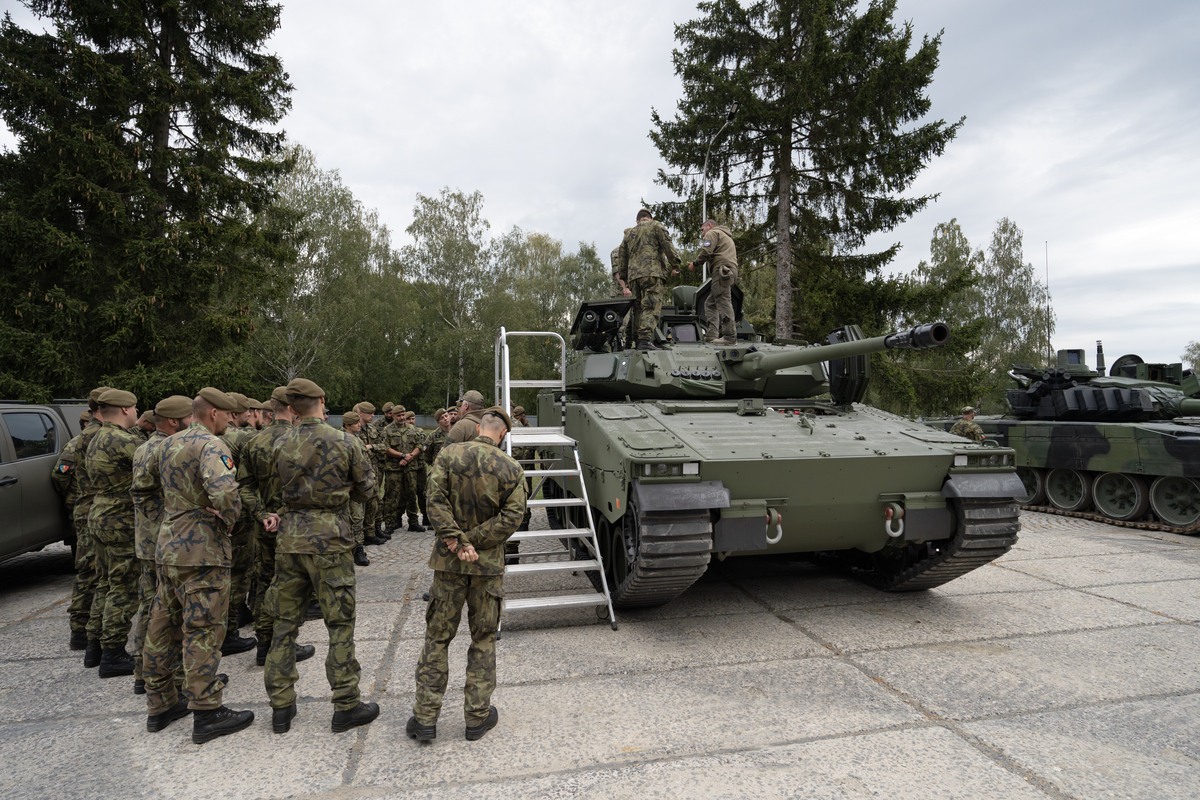
And is it even realistic to achieve these recruitment targets?
We have to achieve this, and soon, because the shortage is really huge. If we are buying the most modern technology, someone has to be able to operate it. Of course, modern technology brings some savings in terms of personnel, but not enough for us to be able to reduce our numbers. We are therefore trying to increase funding both for existing soldiers, so that they do not leave, and for new soldiers.
Is there any alternative if the target of 37,500 soldiers is not met? Previous Capability Targets have also failed to be met.
A professional, modern army with well-paid and well-equipped soldiers is the alternative I have chosen, and I firmly believe that Prime Minister Fiala's entire government does too. If this alternative were not on the table now, the only option we would have, and the one that some other countries within the European Union are pursuing, would be to introduce compulsory military service and recruit soldiers in this way. But that is something we wanted to avoid. That is why we have been talking for two years now about improving conditions for soldiers, because recruiting new soldiers and retaining existing ones is the most important strategic project.
Will the Capability Targets 2025 and Concept for the development of the Czech Armed Forces 2035 be met?
We must admit that we are not meeting the 2021 Capability Targets. Meeting those that will be approved this year will be very challenging, but we must do so. In order to achieve all our goals, it is essential that the defence budget increases. This is because the army's deficit over the past decade amounts to hundreds of billions of crowns. The concept for the development of the Czech Army until 2035 was written by the army in a situation that is changing and evolving dramatically. It is therefore natural that the adoption of new Capability Targets may lead to a reassessment of the development concept. As stated in its conclusion: ‘Its implementation will be evaluated after two years and updated in 2027, unless the need arises earlier.’ So if necessary, it must be changed.
You recently presented a plan to increase soldiers' salaries. Why now?
It is not true that I am only introducing it now. I have been trying to take steps to improve conditions for our soldiers throughout my entire time as Minister of Defence. As you know, we have adopted a new regulation concerning the active reserve, which addresses benefits for members of the active reserve. I have always tried to ensure that the army is not forgotten, which is why I have proposed various measures over the past three years to ensure that our soldiers have adequate financial resources. To give you some specific examples, there have been three salary increases since I took office. In 2022, it was 700 crowns, in 2023 it was 10% of the tariff, and this year it was 1,500 crowns. Travel allowances increased by 11% and, conversely, accommodation payments were reduced by 50%. I was made aware of this issue by the soldiers themselves, who said they couldn't afford to pay six or seven thousand for accommodation, so we reduced the payments by 50%. These were all partial steps that we took without having to amend the Professional Soldiers Act.
From the very beginning of the process of opening the Act on Professional Soldiers, I told the soldiers that if the Act was not approved in an accelerated procedure, in the so-called 90-day procedure, I would withdraw the bill because I did not want to risk someone addressing the issue of pensions for soldiers in a negative way in the amendments, as had been common in the past. When the law came before the Chamber of Deputies, I was informed by the ANO movement a few hours before the vote that they would veto the bill. So I thought there was nothing I could do, that I would have to withdraw it because I could not keep my promise to the soldiers. Then I thought of one last option, and right there in the Chamber of Deputies, I went to the leader of the ANO movement, Andrej Babiš, and asked him to reconsider the ANO movement's decision, because our soldiers really deserve better conditions. Andrej Babiš then took the microphone and said that although there had been an agreement in the club to veto the proposal, I had ultimately convinced him not to do so. Thanks to this move by Andrej Babiš, the proposal was able to pass in the so-called ‘ninety’. The amendment to the law was recently signed by the president, and now we can take concrete steps. However, if my colleagues had taken advantage of my original offer, which was made last spring, the law could have been in force long ago and it would not have had to be done at the last minute. I really cannot be held responsible for that. Believe me, I was not bored at the Ministry of Defence, and I used every day to change legislation and improve conditions for the modernisation of the army and for the soldiers themselves, so that we would be able to meet our recruitment targets.
Can you outline the most significant changes that the amendment to the Professional Soldiers Act will bring and when they will come into effect?
I hope it will be as soon as possible, because I have fresh data from the General Staff, which mentions that, I believe, 720 or 730 people no longer want to extend their contracts and, for various reasons, want to leave the army in the coming months. And why are these people leaving? Because politicians have always promised them better conditions, but nothing tangible has actually happened. I just want the funds that we are guaranteed by law, and our soldiers need to have a reason not to leave en masse, because further mass departures would be truly fatal for the fulfilment of our tasks within the North Atlantic Alliance. And we cannot afford that. Whenever the state needs help, it turns to the military – during COVID, various natural disasters and the like, when our helicopters flew and helped as part of the integrated rescue system. And that's fine, we are part of the integrated rescue system. But in order to fulfil these tasks, which are not our primary tasks, we need enough people. I really don't like comparisons when someone says, ‘But members of the security forces must have exactly the same pay as members of the army.’ They can't. And do you know why? Because they are completely different types of services.
The government has approved an increase in defence spending to 3% of GDP by 2030. Is this sufficient given the need to modernise the army, and how will you commit future governments to maintaining this trend?
There are a number of current opposition politicians who were supporters of Donald Trump, who, during his first term in the US administration, made no secret of the fact that Europe should not be a free rider and should contribute more to defence. So I assume that all those who wore red hats and cheered for Donald Trump during his second election campaign heard him clearly when he talked about 5% of GDP. However, I believe we should keep our feet on the ground. 5% is a lot. That's almost 470 billion crowns. The problem here is that even if I hired twice as many civil servants, there still wouldn't be enough people to process it all. It's not that we don't have anything to spend the money on, but the process simply involves a huge amount of administration, and we have to manage it on an ongoing basis. That is why the Prime Minister and the entire government are proposing that we aim for 3% by 2030. I think this will also be one of the issues discussed at the NATO summit in The Hague this summer, and that a commitment will probably be made there for member states to move towards 3% as quickly as possible. And here, the Czech Republic can say that, within the framework of the government resolution, it guarantees that future budgets for the next period will be prepared in this spirit so that we can achieve the target of three per cent in 2030. And if any government dares to change this, it will be going against its own citizens, against its own security and, in fact, against the Czech Republic itself.
The Alliance must clearly show that it is strong, that it is united and that we have learned from previous years, when we somewhat resigned ourselves to our own defences under some cloud of idealism that there would never be war here again. However, this is a utopia; it will never happen. Human history clearly shows us that at various intervals and in various cycles, certain individuals always have certain imperial, religious or other tendencies, and we must be prepared for this. So if the next government cuts defence spending, it will be working against itself.
What is the current status of the major acquisition projects you have launched? And what are the Czech Army's future ambitions, particularly in the area of air defence?
I will start with the F-35 aircraft, because this is obviously a topic that resonates in the public sphere. As the President said, everyone is now an expert on supersonic aircraft. The first pilots have already begun training in the US on the F-35. The first aircraft for the Czech Republic will be manufactured in 2029, when full training will begin. Last year, we managed to negotiate that we will receive two aircraft a year earlier, i.e. in 2030 instead of 2031, which will speed up training. As for the Gripen aircraft, we still have one round of modernisation ahead of us. The final details of the lease extension are currently being negotiated. I am pleased that we have received an offer from Sweden that is now much more advantageous than the previous ones. It is roughly 25% better, and we are currently evaluating this offer in cooperation with the army. If we accept it, it will be signed during my term of office. We agreed on the tanks in the government last year, and now we are negotiating the Leopard 2A8 tanks. Specifically, we are now waiting for Boris Pistorius to be reappointed as Minister of Defence. Similarly, the CAESAR acquisition is in progress, and we will soon receive prototypes and conduct military tests. Factory tests are underway for the SPYDER anti-aircraft missile system, and the first deliveries should be made in the autumn. According to the current KVAČR, we should procure, for example, 120 mm self-propelled mortars, larger transport helicopters and C-RAM defence systems after 2030. We also want to purchase MARS combat vehicles with an integrated anti-aircraft system from SVOS Přelouč, which are manufactured in cooperation with the Swedish company Saab. The air defence system will consist of several platforms and segments. When I recently visited our missile troops in Strakonice, they explained to me exactly how the individual systems are interconnected and how they communicate with each other. Air defence is something the army will focus on a lot, because the war in Ukraine has shown that whoever controls the airspace is better able to manage a conflict.
How will military infrastructure be modernised? Are you planning to invest in new bases, storage facilities or training facilities?
Modernising the army is not just about new technology, of course; investment in infrastructure is also essential. We plan to invest considerable resources in this area. We are also looking for new, modern solutions for rapid construction, approaching the private sector, cooperating with technical universities and seeking examples of good practice. Specifically, for example, we will be building garages for new equipment, whether for new IFVs or tanks. Significant investments await us in Čáslav in connection with the transition to fifth-generation aircraft. Last year, after lengthy legal proceedings, we managed to regain the Líně airport complex, which will gradually be put back into use by the army. In the coming years, it will become a logistics centre for army needs or an active reserve base. We are also investing in the Bochoř airport near Přerov. However, we are not forgetting the renovation of accommodation facilities and other parts of the bases to improve the working conditions of soldiers.
To what extent is the Czech defence industry expected to be involved in future major acquisitions? What steps are you taking to support domestic manufacturers? Do you support the trend towards maximum self-sufficiency in the defence industry?
Support for the domestic defence industry is crucial. Firstly, for security reasons, because in times of crisis we can only rely on what we have on our own territory, and secondly, for economic reasons. According to various analyses, every crown spent wisely on defence will bring three more crowns to the Czech economy. However, we cannot manufacture everything in the Czech Republic; for example, we will never manufacture fifth-generation aircraft. However, we strive to involve Czech industry as much as possible in all such contracts, and I can say that we are succeeding. Since I took office, the ministry has concluded over 41,000 contracts worth CZK 435 billion. Of this, Czech companies have won over 39,000 contracts worth approximately CZK 148 billion.
Is it still true that the Public Procurement Act is not the main obstacle in the acquisition process?
I don't see a problem with the law. It gives us the opportunity to purchase items that are important for national defence and security through a process other than normal procurement. At the beginning of the election period, we also managed to adapt the law in this regard. We removed some unnecessary obstacles in the procurement process, but this is a long-term project. We need to work more on removing various regulatory problems that complicate the whole process. This also applies to the EU, which, fortunately, is addressed in the recently presented White Paper on Defence. One factor is also being overlooked, and that is the ‘self-confidence and courage’ of people. By this I mean that people at the ministry often become the target of various unjustified accusations and unfounded allegations, where it is not a question of ‘if’ but ‘when and how’ they are enriching themselves at the expense of defence. Unfortunately, these unfounded cries and accusations have become a regular feature of some politicians' agenda.
Some time ago, you criticised army logistics and the fact that it takes several years to prepare equipment regulations. What is the current status?
We have taken a number of measures in this area. My criticism stemmed from frustration at how long some processes within the ministry take and how long it takes, for example, to amend a single decree. I can now say that things are moving forward and the equipment decree is being finalised. It should come into force in July and will also include amendments to the law on professional soldiers. As a ministry, we are ready to order equipment for soldiers in the required quantities and quality, but everything depends on the requirements of the army as the user. If the user, i.e. the army, does not specify its requirements sufficiently and in a timely manner in the form of specific orders from concluded framework agreements, it is very difficult to procure equipment. Equipment stocks are created in accordance with internal army regulations, with selected conceptual documents and plans currently being revised. Furthermore, the standard for central warehouse stocks has been adjusted to remove obsolete components and supplement quantities according to current needs. The stock levels will be evaluated by the responsible persons on an annual basis and, if necessary, appropriate measures will be taken. We are continuing to purchase the required equipment components.
How do you think European NATO members should respond to Donald Trump's various statements regarding the purchase of American military systems?
The US remains one of our closest allies and strategic partners. I am not concerned that F-35 aircraft, for example, will cease to function. This is a joint project involving eight countries, not just the US. And it is certainly not in the security or economic interests of the United States to undermine this cooperation. We have to purchase some equipment abroad because we simply cannot and will not be able to manufacture it. Fifth-generation aircraft are a case in point. They are such a sophisticated system that only a few countries in the world are capable of manufacturing them. That is why we have to buy some equipment in the US and some in Israel, for example. Security of supply is important to us in any purchase of military equipment, so we are happy if the supplier is from the Czech Republic or Europe, as this also supports our defence industry. Nevertheless, some technologies are not available in our country; that is simply a reality that cannot be changed at the snap of a finger. When you don't have the capacity and know-how, you have to rely on allies who do. Fortunately, we have such allies, but that doesn't mean we are giving up on improvement. I believe that all European countries feel this change, and the recently presented White Paper is a step in the right direction.
Is your view of cooperation between partners within the EU and NATO changing in terms of building European defence structures with less dependence on the US?
There is no question that we must strengthen Europe's involvement in its own defence. We have known this for a long time, and the US administration has repeatedly said so. President Trump has simply started saying it very bluntly and loudly. However, it remains true that we must build our defence in cooperation with the US and that it must be based on strong transatlantic ties. It would make no sense to create parallel European structures.
What do you think will be the role of the V4 in defence activities in the future?
The current state of cooperation is affected by the differing positions of Hungary and Slovakia on the war in Ukraine. Despite some of our differences, we are trying to find common ground. We are therefore focusing on developing practical military cooperation. Strengthening cooperation within the V4 is now more on a bilateral or trilateral basis. For example, Poland and Slovakia are jointly procuring hand-held anti-aircraft weapons. We recently signed a Declaration on Cooperation in the Procurement of Military Equipment and Services with Slovakia, which follows on from the successful joint purchase of Tatra vehicles. At the same time, mutual cooperation is working well, for example with Hungary in the exchange of information on the acquisition of C-390 and Gripen aircraft, or our joint purchase of CV90 vehicles with Slovakia.
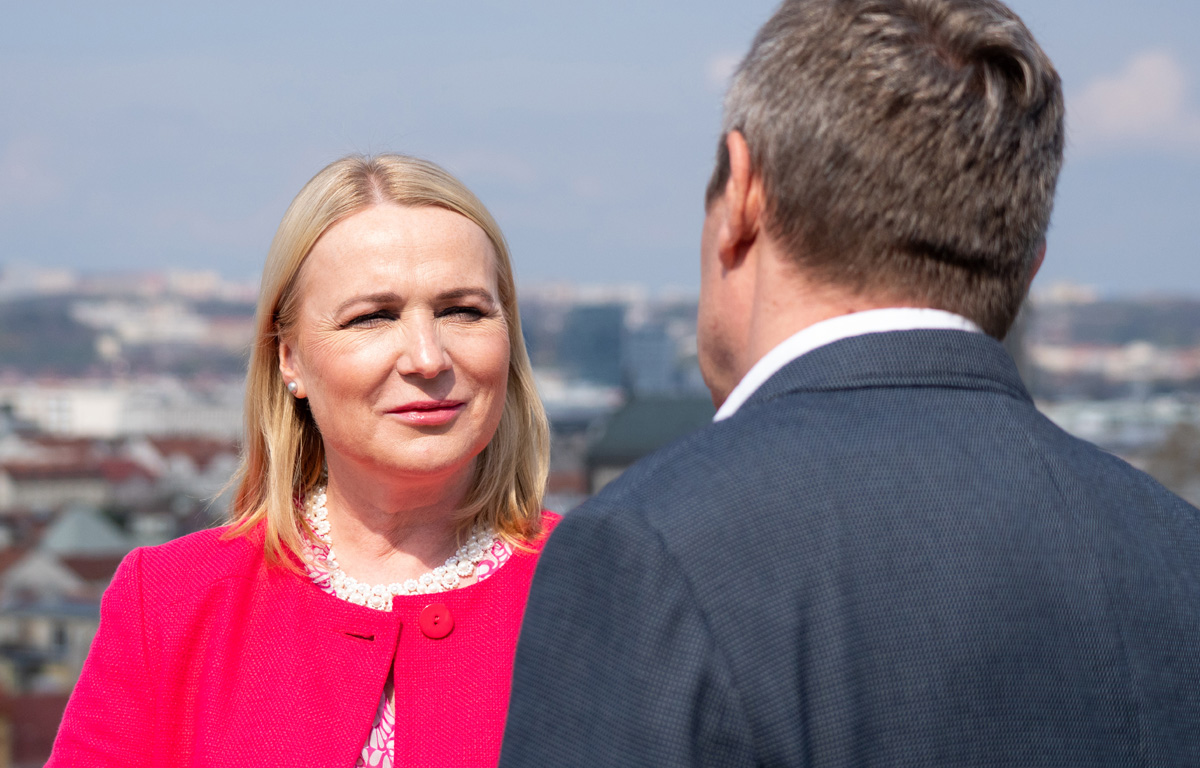
How would you assess the events that took place during your term as Minister of Defence?
I think that at that time, as a government, we found ourselves in a situation that no one envied us, when we had been ministers for two months and war broke out in Ukraine. Similarly, none of us could have imagined that the situation in the Middle East would escalate and lead to unprecedented bloodshed. Hundreds of Israelis, young men and women, have lost their lives, which is something we find very difficult to come to terms with. And of course, I am only talking about these two major conflicts, but there are a number of other conflicts, other countries that have been broken during our time in government. I am thinking, for example, of the countries of the Sahel, which, when I took office as Minister of Defence, could be said to have certain democratic systems. Unfortunately, this has changed, partly due to the arrival of Wagner groups linked to the Russian regime. So the world is really changing before our very eyes, and it is changing for the worse. The illusion that after the end of the Cold War, humanity would live in peace for at least 100 or 200 years has definitely not come true. I consider it a big mistake that spending on our defence has been neglected here over the last twenty years, so that today we have an internal debt to the army of some 620 billion crowns. These are funds that our army should have received if the two per cent target had been met. If we take inflation into account, the internal debt could even be one trillion crowns, and we are obviously missing this money.
What are you proud of during your term in office, what has been successful under your leadership, what has not been so successful, and what would you wish for your potential successor as Minister of Defence?
We have managed to launch the largest modernisation of the Czech Armed Forces in modern history, and we have done so under very difficult conditions. Our government has had to deal not only with the war in Ukraine, the refugee wave and the energy crisis, but also with floods, and we are facing the spread of foot-and-mouth disease among our closest neighbours. I am convinced that we have much to be proud of, and my colleagues deserve a big thank you for that. You will always find something that didn't work out. I had hoped that some processes would be accelerated sooner. But I am convinced that we did what we could. I would wish my successor, whoever that may be, a lot of strength and courage, because you cannot do without them at the Ministry of Defence.











